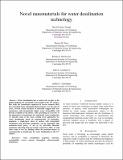Novel nanomaterials for water desalination technology
Author(s)
Cohen-Tanugi, David; Dave, Shreya H.; Grossman, Jeffrey C.; McGovern, Ronan Killian; Lienhard, John H
DownloadGrossman_Novel nanomaterials.pdf (749.0Kb)
OPEN_ACCESS_POLICY
Open Access Policy
Creative Commons Attribution-Noncommercial-Share Alike
Terms of use
Metadata
Show full item recordAbstract
Water desalination has a central role to play in the global challenge for sustainable water supply in the 21st century. But while the membranes employed in reverse osmosis (RO) have benefited from substantial improvements over the past 25 years, several recent advances in materials suggest that new membranes with dramatically higher water permeability will become available in the future. After providing an overview of the importance of membranes for sustainable water production, we describe some of the most exciting novel approaches for water desalination based on nanomaterials. In particular, graphene, a single-layer sheet of carbon with remarkable mechanical and electronic properties, can be patterned with nanometer-sized pores, to act as an ultra-thin filtration membrane. Drawing from our group's research at MIT, we will share some of our key findings about the potential impact of nanomaterials as membranes for water desalination in the 21st century.
Date issued
2013-08Department
Massachusetts Institute of Technology. Department of Materials Science and Engineering; Massachusetts Institute of Technology. Department of Mechanical Engineering; Abdul Latif Jameel Poverty Action Lab (Massachusetts Institute of Technology)Journal
Proceedings of the 2013 1st IEEE Conference on Technologies for Sustainability (SusTech)
Publisher
Institute of Electrical and Electronics Engineers (IEEE)
Citation
Cohen-Tanugi, David, Shreya H. Dave, Ronan K. McGovern, V John H. Lienhard, and Jeffrey C. Grossman. “Novel Nanomaterials for Water Desalination Technology.” 2013 1st IEEE Conference on Technologies for Sustainability (SusTech) (August 2013).
Version: Author's final manuscript
ISBN
978-1-4673-4630-6